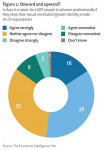Despite protectionist impulses, the US remains the world’s best environment for IT producers, says the Economist Intelligence Unit
“Globally, the IT sector has ridden out the crisis reasonably well, despite reduced technology spending” says Denis McCauley, Director of Global Technology Research with the Economist Intelligence Unit. “Rather than pushing short-term measures designed to expand sector output or support ailing technology firms, policymakers need to remain focused on strengthening the fundamental enablers of long-term sector competitiveness.”
Despite the emergence of such protectionist impulses, the US retains its top ranking in the Economist Intelligence Unit’s IT industry competitiveness index in 2009. Other strong performers in the index are Canada and west European countries such as Finland, Sweden and the Netherlands. Each boast highly developed and widely accessible IT infrastructure and offer strong support for technology R&D. US leadership is also cemented by an educational environment which continues to develop high-quality technology talent. In emerging markets, large pools of skilled IT employees remain a significant advantage for China, India, Russia and other countries, but uneven progress in other areas, such as IT infrastructure, remains a drag on their IT sector competitiveness.
The index results are highlighted in a new report, Resilience amid turmoil: Benchmarking IT industry competitiveness 2009, written by the Economist Intelligence Unit and sponsored by the Business Software Alliance (BSA). Following are the other major conclusions of this year’s study:
· Broadband networks are becoming increasingly essential to IT firms’ competitiveness. Broadband’s importance will grow as more IT services and applications are delivered over the Internet. Technology producers in broadband-rich countries in western Europe, North America and developed Asia are clearly at an advantage in this respect. Conversely, the slow march of broadband in emerging markets, including those with large IT sectors such as India, Brazil and Russia, could impede their IT firms’ growth.
· Investment in skills development remains a long-term imperative. The recession has eased IT talent shortages, but as economies recover, competition for the best talent will again grow fierce. Co-ordinated efforts among governments, universities and IT firms are needed to improve the quality of technology training and expand the pool of potential hires. In Asia, IT training would benefit from greater investment in business studies and language skills. In Europe and North America, governments must work with companies to encourage more young people to choose mathematics and science-based subjects at universities.
· IP regimes are improving in many emerging markets, but more progress is needed. Robust IP (intellectual property) protection remains essential to IT sector competitiveness. IP regimes are strong in most developed markets, and emerging economies such as Brazil, Egypt and Vietnam are also registering slow but steady progress, particularly in the area of enforcement. As innovation gradually becomes more important than low-cost labour to IT firms in China and India, IP enforcement is expected to improve in these countries as well.
“Information technology offers productivity and efficiency gains that benefit nearly every segment of every economy. Support for the long-term development of a competitive IT sector can accelerate the economic recovery and lay a foundation for the technology solutions of the future,“ says Robert Holleyman, president and chief executive officer of BSA. ”In the uncertainty of today’s economic climate, pro-innovation policies that cultivate growth in the technology sector are more important than ever.”
Methodology: How the scores were derived
The IT industry competitiveness index is organised into six distinct categories of quantitative and qualitative indicators, numbering 26 in all. The category and indicator weights were formulated at the time of the index’s creation by the Economist Intelligence Unit’s modelling team using, as a guide, individual correlation co-efficients of each indicator against a measure of IT labour productivity. The weights are reviewed each year by the modelling team, and those for selected indicators have been adjusted in 2009, both to accommodate the addition of a new indicator and to reflect the team’s evolving views on the relative importance of all the indicators. (The relative weights of indicators suggested by the original correlations, however, have been maintained.). The categories and their weights are: overall business environment (10%), IT infrastructure (20%), human capital (20%), legal environment (10%), R&D environment (25%) and support for IT industry development (15%).
Several improvements have been made to the index model in 2009. First, a new indicator—mobile phone penetration—has been added to the IT infrastructure category. Newly available data has also been sourced from the European Patent Office (EPO) to score the IT patents indicator in the R&D environment category. (Previously, IT-related patents were estimated using a measure of IT sector output as a share of GDP, which was applied to total domestic patent applications.) In deriving employment levels in the IT sector, hard data now available from the Organisation for Economic Co-operation and Development (OECD) is used for a large number of countries, which has also enabled a refinement of estimates of non-OECD countries. (Previously, IT employment was estimated for all countries in the index.) As noted above, the weights of several indicators have also been adjusted.
Qualitative indicators are scored by Economist Intelligence Unit analysts according to specific scoring criteria. Quantitative indicators are normalised, so that each country is measured from 0 to 1 by applying a formula to each data point. Each indicator is then converted into a score of 0-100. The composite score for each country is also based on an index range of 0 to 100, with 100 representing the highest and best possible score. The data used in the rankings are sourced from the Economist Intelligence Unit, the United Nations, the World Bank, the World Intellectual Property Organization, IDC, Pyramid Research and other organisations including the OECD and EPO. For more information on the methodology, please refer to our white paper.
웹사이트: http://www.eiu.com
연락처
Joanne McKenna
Press Liaison
Economist Intelligence Unit
26 Red Lion Square
London
WC1R 4HQ
UK
Direct: +44 (0) 20 7576 8188
Sales: +44 (0) 20 7576 8181
Switchboard: +44 (0) 20 7576 8000
email: 이메일 보내기
이 보도자료는 Economist Intelligence Unit가(이) 작성해 뉴스와이어 서비스를 통해 배포한 뉴스입니다.




